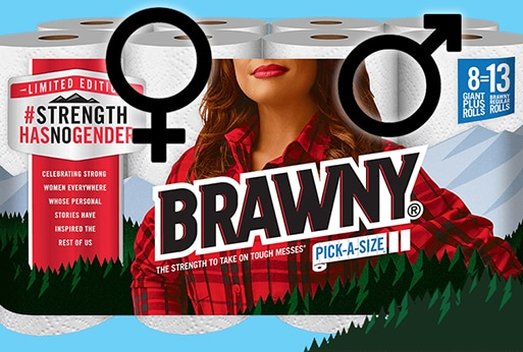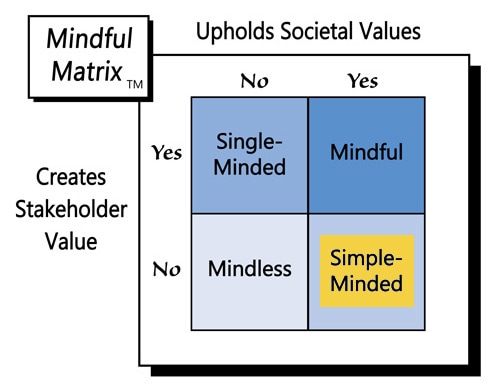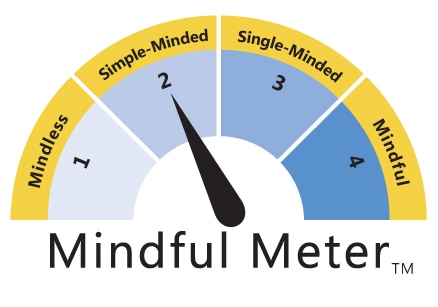One of the best known household brands, Brawny is often remembered for the eye-catching picture plastered on the wrapper of its paper towels. The image, which has gone through various iterations over the years, has been of the head and/or chest of a man who looks burly, powerful, strapping . . . in other words, “brawny.”
Unlike other spokes characters who have kept a pretty consistent appearance over the years (e.g., the Jolly Green Giant, Captain Crunch), the Brawny man’s look has changed significantly at times. One of the more recent images consists of just a cross-section of a man, from lips to chest, sporting about seven days’ growth of beard. An earlier image was more clean-shaven and complete: One could see all of the Brawny man from waste up, including his barrel chest and log-sized arms.
Most often the Brawny man has been a brown-haired Caucasian. At one point, though, he was a mustache-wearing blond in a blue top. Almost always, however, he has worn the same thing, a rugged-looking red plaid shirt, which probably has been the most memorable part of the paper towel packaging. Of course, the reason for this visual and verbal branding (the man and the Brawny name) has been to convey that these paper towels are stronger and tougher than those of competitors. In fact, Brawny uses the tagline “The Strength to Take On Tough Messes.”
The preceding description is important in order to appreciate Brawny’s decision to replace its male brand icon with a female counterpart. The change isn’t permanent, but for the month of March, in honor of Women’s History Month, a “Brawny woman” graces the front of all its paper towel packages.
The Brawny woman looks similar to the man in terms of her brown hair and fair skin. Of course, she wears a red plaid shirt. Her physique is more slender than stout; however, she strikes powerful poses that show her with either arms crossed over her chest or hands placed boldly on her hips. We can’t see all of her, but what’s visible reinforces Brawny’s special tagline “Strength Has No Gender.”
What should we make of Brawny’s bid to honor women with a cameo on its paper towel packages? At first blush, it’s hard not to view the effort as noble. Given the injustices that many women have suffered and the biases they continue to endure, it’s especially nice to see a company such as Georgia Pacific, parent of the Brawny brand, pay homage to both women’s inner and outer strength.
“Yes, but Brawny isn’t just being benevolent,” some may argue. “The company is trying to profit from Women’s History Month.” Undoubtedly, there are brains behind the brawn, and the company is looking out for its bottom-line, as any responsible organization should. After all, if Brawny somehow went belly-up, there would be many unhappy customers, dejected suppliers, and desperate employees—both women and men.
But, is Brawny’s temporary packaging really a profit-making proposition? It’s hard to know for sure, but one must first consider that the company is incurring extra costs in making the short-term switch, e.g., design and printing. Then, one must wonder whether the special packaging produces incremental sales.
From my experience, grocery shoppers are notoriously price sensitive, usually looking for the best deal, especially for things like paper products. However, people do develop brand loyalties for certain things, which makes them somewhat less price sensitive, but also less likely to switch brands, e.g., a Bounty user probably won’t buy Brawny just because of some special packaging.
There’s also the question of whether shoppers will even notice the novel wrapper. Supermarket shelves are overflowing with options, making it hard enough to find what one is looking for, let alone attend to something new. In addition, given that the male and female Brawny photos are similarly cropped and both contain red plaid, people who glance may not even realize it’s a different package.
So, any significant, direct return-on-investment for Brawny is doubtful, but that’s still not the end of the analysis. There’s another compelling question that approaches gender identity from a different angle: What if Georgia Pacific were introducing paper towels now, for the first time? Would it be appropriate to put a woman’s picture on the package?
A prudent answer is probably “no,” not because of anything to do with perceived strength but because paper towels are often used for cleaning, and women are typically the ones typecast as cleaners. So, the use of a female spokes character for a cleaning product could be seen as perpetuating a constricting gender stereotype.
That said, I suspect that virtually no one would currently accuse Brawny of promoting such a stereotype, especially given the context of Women’s History Month. However, as suggested above, I also doubt that Brawny’s attempt at gender equity will make a measurable marketing impact for the brand. Georgia Pacific can be commended for its goodwill, but in the end, people don’t really care if paper towel promotion is masculine or feminine; it’s just “Simple-Minded Marketing.”
Learn more about the Mindful Matrix and Mindful Meter.
Check out Mindful Marketing Ads and Vote your Mind!




 RSS Feed
RSS Feed